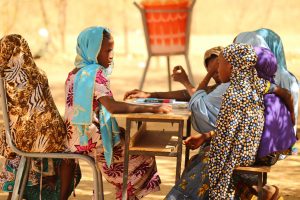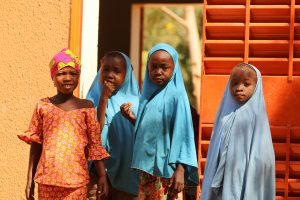By Lara Khosrovian

As a current student within the United States education system, I felt overwhelmingly hopeless when classes were converted to an entirely remote curriculum due to the global pandemic. I felt as though my learning and overall experiences were compromised. However, my resources were never eliminated, support systems were always accessible, and my education never stopped. Unfortunately, none of this can be said about the children of Niger.
In most countries across the world, local schools provide education as well as the opportunity for life lessons and social interaction. These same societies also have designated facilities for healthcare and organizations that provide access to nutrition. This does not hold true for the families in Niger; access to structural necessities is in fact, pure luxury. Nigerien children who are fortunate enough to have a school nearby or are able to make the commute (a distance neither you nor I could ever commit to), rely on school for more needs. For these few students, the school not only provides the basic means of education, but it also serves as a safe place for them to socialize with one another, have meals, and access basic healthcare services.[1] Imagine just how devastating it was for most families of Niger when schools were initially closed in response to the coronavirus outbreak.
The situation in schools worsened during the ongoing pandemic. Hardly any schools have adequate water supplies, with even fewer having toilets.[2] Consequently, the spread of the virus was inevitable. Students are required to share their classroom materials, and without proper sanitation, COVID-19 can spread.

Families had to quickly adapt to a life without schooling and children were expected to contribute financially. School teachers also found other ways to make a living; no schools meant the need to find different jobs. Most Nigerien children do not have access to resources to continue learning the way Americans do; this includes printed materials, radios, and various forms of alternative instruction. Without the necessary means to learn from home, many children simply could not continue their educations.
The pandemic has exacerbated the political and economic insecurity in these communities. Fortunately, schools in Niger were able to reopen at the beginning of the academic year, but the vast majority of schools in Niger lack the basic water and sanitation necessary to mitigate the spread of the virus. As things start approaching a more ‘normal’ reality for us and we pick up right where we left off, it is important to recognize that, in Niger, a life post-COVID is still fraught with life-threatening challenges.
Although not a direct part of education, a clean water supply, and hygiene resources play a core role in helping Nigerien children make the most of the schooling that will help them reach their full potential. With your help, Wells Brings Hope can expand access to clean water and encourage a safe return to school.
[1] https://reliefweb.int/report/niger/niger-12-million-children-and-young-people-were-out-school-because-covid-19
[2] https://www.nrc.no/news/2020/october/12-million-children-forced-from-school-in-sahel/


